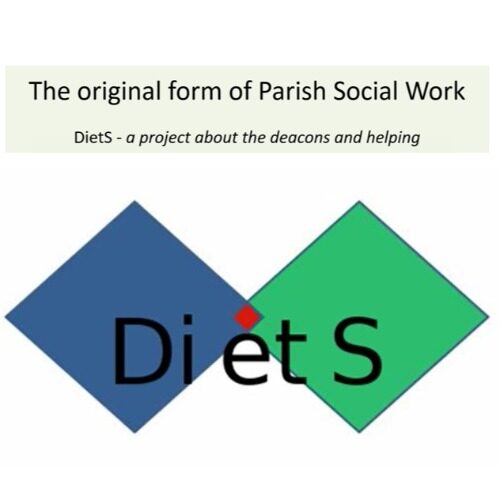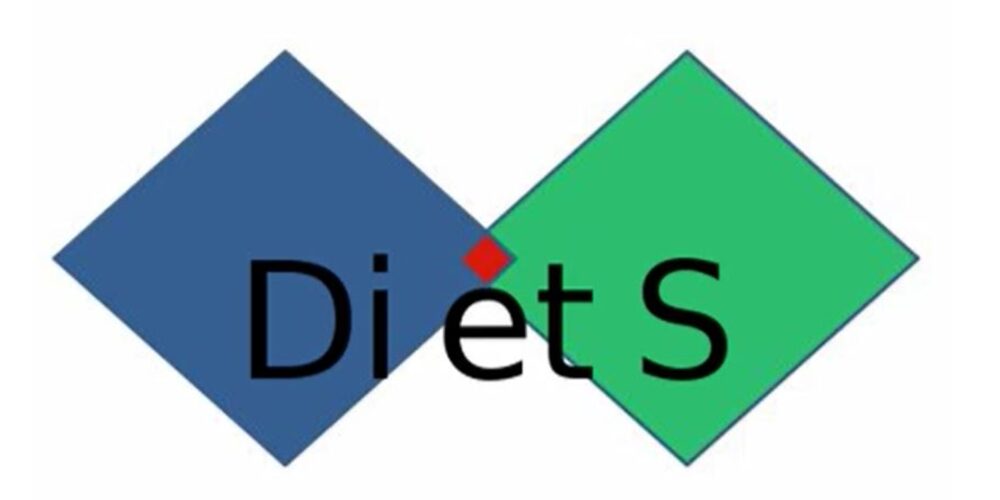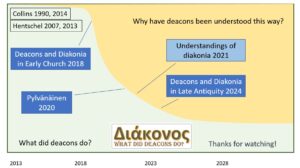
Leaders
The ”Diakonia and Parish Social Work” (DietS) project aims to collect, organize, and encourage the re-examination of ancient sources on diakonia from the 2nd to the 7th century, focusing on the accurate interpretation of roles and duties associated with diakonia and the correction of misinterpretations, extending to contemporary times. This endeavor facilitates opportunities for re-interpretations of diakonia, especially in ecumenical discussions regarding the ministry of deacons and deaconesses. The project promotes collaboration among researchers and underscores the importance of interpreting ancient sources in their original languages, thereby ensuring a comprehensive understanding of diakonia’s historical and evolving significance within the church.
We started in 2013. The starting situation is described in the following video.
The more specific description
The recent discourse on diakonia has been invigorated by the results of linguistic analyses conducted by scholars such as John N. Collins (1990, 2014) and Anni Hentschel (2006, 2013). Although we have gained an understanding of the lexical meanings of the diak-family, we have not yet fully applied this knowledge to the functions of parish life (Gooder 2006, Collins 2012b).
The objective of this meta-project is to compile and organize high-level scientific re-interpretations and to encourage a thorough re-examination of ancient sources related to diakonia (from the 2nd to the 7th century) in their original languages. In doing so, this project aims to uncover accurate interpretations of the roles and duties of deacons and the usage of the term ‘diakonia,’ as well as to rectify misinterpretations. This, in turn, creates opportunities for re-interpretations of diakonia, particularly in ecumenical discussions about the ministry of deacons and deaconesses. If there exists a one-sided or even distorted understanding of the tasks of deacons and the meaning of the term ‘diakonia’ across different centuries, it becomes challenging to achieve consensus on what a common vision of the role of deacons in the church should aim for. In the context of discussing diakonia, this project also analyzes the ministry and functions of a deacon/deaconess and the ways in which early Christians supported one another. Hence, the project is named “Diakonia and Parish Social Work.” (DietS).
The main way to fulfill this objective is to disseminate information (via internet pages, emails, meetings, etc.) and, in doing so, facilitate collaboration between researchers and other projects. This can also lead to new research projects about individuals or topics that have not yet been analyzed. Other methods may also emerge.
On this page, we will gather information about topics that use ancient sources in a similar manner or in ways that are cognizant of the approaches demonstrated by John N. Collins in his book. This page will not compile discussions about deacons and assistance but will instead focus on the interpretation and analysis of ancient source interpretations in their original language.
The main structure of DietS project
As the accompanying video shows, the initiative is divided into different time periods. Presented here are the most significant research materials suitable for each period, individual investigations already conducted (and fitting the initiative’s objectives), as well as undertakings carried out within this initiative (including studies by the initiative leader).
-
Click or tap below to get more information
Files
2 itemsKeywords
Leaders
Senior Researchers
Post-doctoral Researchers
Other group members
-
Doctoral Researcher Harri Hautala hahautal@student.uef.fi







